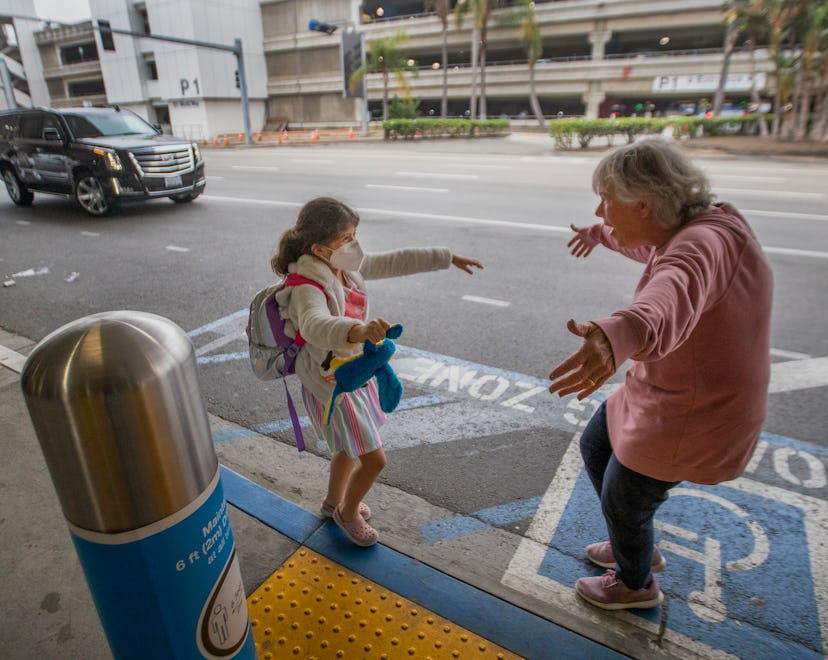Holidays

Should I Travel For Thanksgiving This Year? Experts Weigh In
It’s a big decision.
It may be just the start of the school year, but the holidays will be here before you know it and that leaves many parents questioning the safety of traveling for Thanksgiving. Now nearly two years into the pandemic, families are aching to share a good old fashioned turkey dinner together. But is it safe to travel for Thanksgiving? Before parents book flights, doctors say they need to seriously consider the ramifications of travel, especially as the Delta variant continues to spike in areas across the country.
Can you travel for Thanksgiving?
The better question is probably where and how can you travel for Thanksgiving?
Without a vaccine available for children under the age of 12, a huge portion of the population remains susceptible to the virus, a situation made all the more serious with the temptation of going great distances to see family. As science has proven, enclosed spaces with inadequate ventilation or air handling, like many forms of public transportation (planes, trains, and automobiles), can increase transmission. So what’s a parent to do? Is it safe to travel for Thanksgiving?
Dr. Elizabeth Mack, chief of pediatric critical care at the Medical University of South Carolina’s Children’s Health, strongly urges caution.
What are the safety risks of traveling for Thanksgiving?
“Let’s start with the vaccine for kids. Some are saying it could be ready by October. Other information suggests December or January,” says Dr. Mack. “But it’s not available yet.” And since that’s the case, Dr. Mack says everyone should heed the Centers for Disease Control & Prevention’s Domestic Travel for Unvaccinated People guidelines.
“The CDC is recommending people not travel until they're fully vaccinated,” says Dr. Mack. But, if you absolutely must travel for Thanksgiving prepare for some additional preparation. The CDC says any unvaccinated person (adult or child) should get tested with a viral test 1-3 days before a trip and get tested with a viral test 3-5 days after travel AND stay home and self-quarantine for a full 7 days after travel. And keep in mind, this advice isn’t limited to those just considering flying. This is the recommendation for all forms of travel, even if you’re driving in the old family station wagon.
Add to that the fact that merely making sure your kids are fully tested before and after a trip is just part of the protection plan Dr. Mack wants parents to consider.
That said, Dr. Gary Kirkilas, a pediatrician at Phoenix Children’s Hospital, reminds people that if your children are over age 12 and have been vaccinated, travel is available to you. “If your kids are under 12, err on the side of not traveling. And continue to mask indoors and avoid large groups,” says Dr. Kirkilas.
“I think you need to look at the area you’re traveling to,” says Dr. Mack. The CDC has a dashboard with links to every state’s public health website in the nation. Dr. Mack encourages people to use this tool to get a better picture of the risk associated with their Thanksgiving destination. For instance, in South Carolina, where Dr. Mack works, as of September 4, the state led the nation in Covid-19 infections, according to WLTX. That should give those considering traveling there some pause.
“If you are headed to Alaska in the middle of nowhere, that’s probably alright,” says Dr. Mack. “It’s not apples to apples. Just try to be realistic from that standpoint.”
And don’t be naive and think that kids can’t be seriously affected by the virus. At MUSC Children’s Health, of the 30 children hospitalized with Covid the week of September 8, 13 were in critical care and 9 were on ventilators.
“Today we’ll have two children having heart lung bypass,” says Dr. Mack. “Tomorrow there will be three, if everyone is still alive.”
Which is why Dr. Mack encourages parents to think seriously about delaying Thanksgiving travel and waiting until the vaccine for children becomes available. With any luck, a vaccine for children could be in reach soon enough that families can plan big family reunions by the New Year and enjoy them safe in knowledge that everyone in their family has the vaccine and is protected.
Expert
Dr. Elizabeth Mack, chief of pediatric critical care at Medical University of South Carolina Children’s Health. musc.com
Dr. Gary Kirkilas, pediatrician, Phoenix Children’s Hospital
This article was originally published on